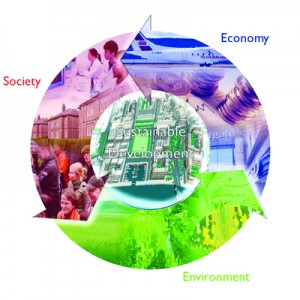Sustainable Development : what is it?
View(s): “Sustainable Development” are words that have been heard very often in the recent past. Sustainable development can be viewed as a possible solution to the environmental threats resulting from the rapid growth of population and the need for increased development. The accurate definition of sustainable development is “development that meets the needs of the present, without compromising the ability of future generations to meet their own needs”. That is, the current generation should implement development strategies that address the needs of the current generation but it should not affect the resources available for the future generations. The general idea is that the future generations should have access to a world similar to that encountered by the current generations.
“Sustainable Development” are words that have been heard very often in the recent past. Sustainable development can be viewed as a possible solution to the environmental threats resulting from the rapid growth of population and the need for increased development. The accurate definition of sustainable development is “development that meets the needs of the present, without compromising the ability of future generations to meet their own needs”. That is, the current generation should implement development strategies that address the needs of the current generation but it should not affect the resources available for the future generations. The general idea is that the future generations should have access to a world similar to that encountered by the current generations.
An analogy for sustainable development would be as follows: in the construction of a home for oneself, one would want to include the latest and modern luxuries. However, these luxuries come at a heavy cost – would an individual spend every cent he/she saved or earned to build this super luxury home? Money would be needed, even after the construction of the home, for food, education etc. So the individual would come to a compromise. Sustainable development is similar to this but, replace money with nature, and replace construction of the home with infrastructural development – and we have a similar situation but on a much larger scale with severe consequences that affects the entire globe.
 The concept of sustainable development came about as a result of the rapid economic development taking place in developed countries with an open-ended access to natural resources. This uncontrolled usage of natural resources raised new concerns on the management of the environment and the manner in which the overuse of resources impacted the environment, along with concerns on the impact of economic development in less developed countries. Just a few months back, the entire world was involved in the Rio+20 summit. The summit which marked the twenty-year anniversary of the inaugural earth summit held in 1992, was a platform that recognised the importance of sustainable development and invited world leaders to join together to discuss sustainable initiatives – that have been or can be implemented in the future.
The concept of sustainable development came about as a result of the rapid economic development taking place in developed countries with an open-ended access to natural resources. This uncontrolled usage of natural resources raised new concerns on the management of the environment and the manner in which the overuse of resources impacted the environment, along with concerns on the impact of economic development in less developed countries. Just a few months back, the entire world was involved in the Rio+20 summit. The summit which marked the twenty-year anniversary of the inaugural earth summit held in 1992, was a platform that recognised the importance of sustainable development and invited world leaders to join together to discuss sustainable initiatives – that have been or can be implemented in the future.
Sustainable development now holds a special significance to developing nations as well. The term now takes on a broader meaning of the development of infrastructure without causing adversities to the natural environment. Countries, such as Sri Lanka, are blessed with an abundance of natural resources. It is this natural bounty that has earned Sri Lanka the honour of being a ‘bio-diversity hotspot’. Being a small country, it means that every day we come in to contact with nature – this also means that our actions have a very strong impact on the environment. Thus it is our responsibility to ensure that at a time of rapid development, we also take the time and effort to ensure that we preserve our natural heritage as well.
Ultimately, sustainable development is all about a balance. It is about striking a balance between the environment, the economy and the needs of society (as shown in the image). Ultimately, it is these three factors that play an important role in development.
Thoughts/innovative ideas/comments that you would like to share can be sent to savegreenwithet@gmail.com.
Joanne Kotelawala – British Council International Climate Champion 2010, British Council Active Citizens Facilitator.

Follow @timesonlinelk
comments powered by Disqus
























